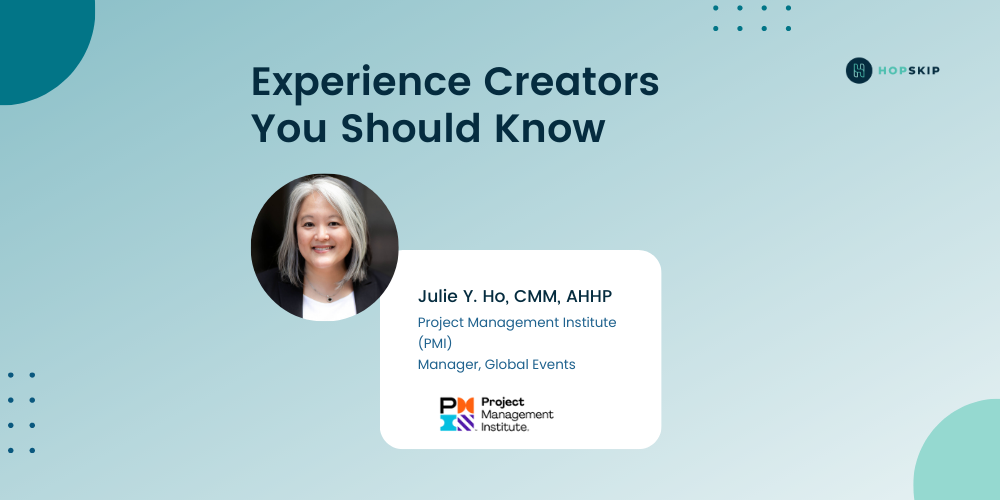Experience Creators You Should Know - Julie Y. Ho- Project Management Institute
Julie Y. Ho, of Project Management Institute, discusses how she honed her skills over the pandemic to now be in position to overcome the challenges that the new meetings/events landscape brings.

This post is part of the HopSkip Planner Spotlight Series where HopSkip spotlights planners across the industry to bring awareness of how they adapted to COVID-19, communicating and lessons learned and sharing how they are viewing the meetings and events industry in a post-pandemic world.
Name: Julie Y. Ho, CMM, AHHP
Company Name: Project Management Institute (PMI)
Job Title: Manager, Global Events
Years of Experience: 25
Planning events today in a post- pandemic world is much more complex as many aspects of the industry are still coming back to life and that includes individuals that work in our industry now.
Attendee behaviors have changed! We are seeing an unusual pattern of last-minute decisions to register and attend events. Prior to Covid, booking the discounted sleeping room block was a driver to register early. Today it seems as though securing a discounted hotel room is not much of a concern.
What hasn’t changed is that while our event planner network is large and spans the globe, we still reach out to one another for feedback, guidance, and inspiration. I really love that about the event industry. We continuously help each other as we navigate a new normal.
Trust is really important to me when we engage with our partners. At the end of the day, we are working together to create an experience for the attendee – one that is flawless and keeps them wanting more. I value being able to speak openly with my vendors and call out issues – but I do so with a mindset of how we can come together and align for the greater good of the experience. If you are new to the job, tell me. If you are not familiar with what I am asking for, just speak up. Let’s work together and get it right so our attendees have the best experience!
When embarking on a new vendor relationship, I always ask what their three-year outlook will be for their product or service. It’s a good way for me to determine if we’re going to work well together because their responses show me how engaged they are with their clients and how they are looking to evolve their product or service into the future.
Always give a new concept at least 2-3 years to really take off or not. Instead of attempting something once, consider iterating at least 2-3 times. As an example, at the start of the pandemic, it was really important to find ways to engage with our attendees when participating in PMI’s Virtual Experience Series. While chatrooms were available, we had a difficult time encouraging attendees to participate, let alone engage with one another. We developed a few conversation-starter topics, and it took us a few times to get it right. We didn’t give up and kept trying new questions and styles. Now these Community Conversations are a highlight of the event.
With hotels short-staffed, and RFP lead time shortening, what is your advice to other planners to overcome these obstacles when requesting hotels for proposals?I’m finding that socializing the “Why” with my stakeholders is critically important for them to understand how event sourcing and planning work. Even more so since we have been virtual – educating how an event comes together and the lead time required to make it successful allows you to engage with a business partner so you can work together to create a great experience for all.
We are still re-learning at this time, but the response time to RFPs is concerning. Hotels are taking longer to respond to RFPs, and planning needs to start even earlier. Also, hotels that are privately owned are less likely to negotiate with a spirit of long-term opportunities.
We are currently reviewing our event tech stack and hoping to define further opportunities to streamline how different systems work with each other and without the manual effort. It has forced us to think differently about what is absolutely necessary or what are the “nice to haves.”
This is hard for us all, but make the time for it. I often get an email to have a chat about thoughts or opinions on a topic, and I always make time for them because 1. You are building a relationship, and 2. You never know what you learn from this person or what you can validate with this individual on the topic.